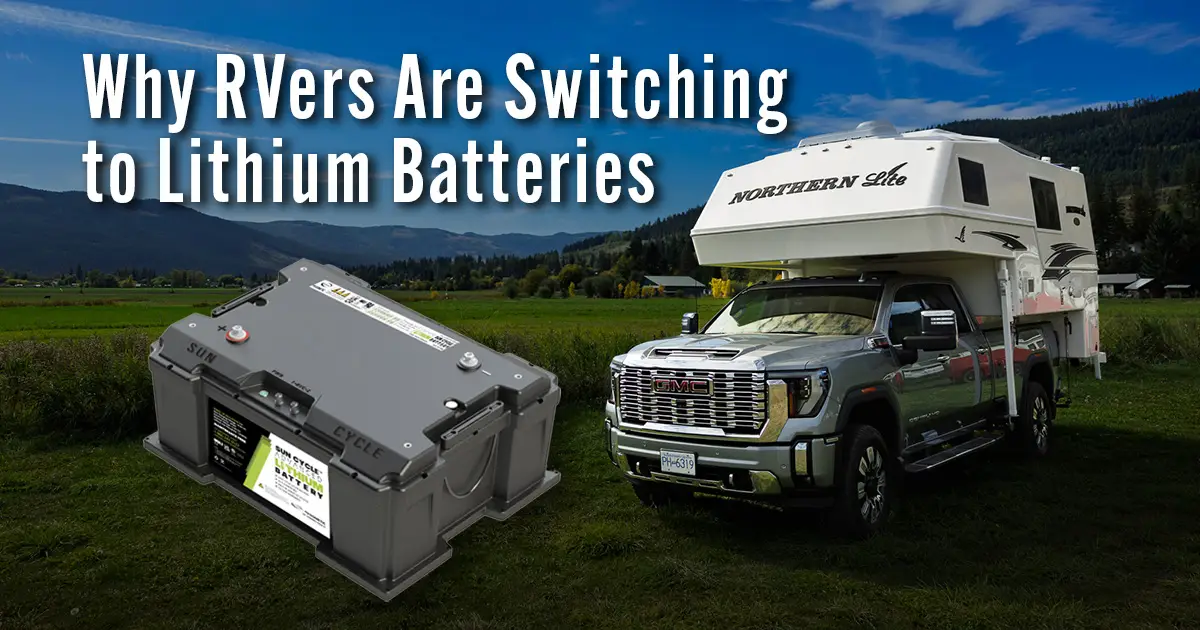
Why RVers Are Switching to Lithium Batteries
If you’re an RVer looking to upgrade your power system, you’ve probably heard the buzz about lithium batteries for RVs. They’re lighter, longer-lasting, and more efficient than traditional lead-acid options. But are they really worth the higher upfront cost?
This guide breaks down everything you need to know about RV lithium batteries—how they work, why they’re better, and whether they’re the right choice for your rig.
What Is a Lithium RV Battery?
When RVers say “lithium battery,” they’re usually referring to Lithium Iron Phosphate (LiFePO4) batteries. Unlike the lithium-ion batteries in phones or laptops, LiFePO4 chemistry is:
- Stable and safe (no thermal runaway risk like older lithium types).
- Deep-cycle ready—perfect for RVs, boats, and solar power systems.
- Long-lasting with thousands of charge cycles.
These characteristics make LiFePO4 RV batteries one of the most reliable energy storage options on the market.
Benefits of Lithium Batteries for RVs
Switching to lithium isn’t just a trend—it’s a major upgrade. Here’s why:
- Long Lifespan
- Lithium batteries last 8–10+ years (3,000–5,000 cycles).
- Lead-acid batteries typically last 2–4 years.
- Over time, lithium offers a better cost-per-cycle.
- Lightweight and Compact
- Up to 70% lighter than AGM or flooded lead-acid batteries.
- Saves hundreds of pounds in larger battery banks.
- More Usable Power
- Lead-acid: only 50% usable capacity.
- Lithium: up to 100% usable capacity.
- A single 100Ah lithium = two 100Ah AGMs in usable energy.
- Faster Charging
- Accept higher charge currents.
- Recharge in a fraction of the time.
- Perfect for solar RV setups or generator charging.
- Steady Voltage Output
- Appliances run more reliably.
- No dimming lights or struggling electronics.
- Zero Maintenance
- No topping up water, equalizing, or frequent replacement.
- Install once and enjoy.
Downsides of Lithium RV Batteries
While lithium batteries are excellent, it’s important to know the challenges:
- Higher Upfront Cost – Expect $600–$1,000 for a 100Ah lithium vs. $200–$300 for AGM.
- Cold Weather Charging Limits – Can’t charge below 0°C (32°F) unless the battery has a built-in heater.
- System Compatibility – Older RV converters/chargers may need upgrades.
- Installation Complexity – Some RVers need professional help to retrofit.
How Many Lithium Batteries Do You Need for Your RV?
It depends on your camping style:
- Weekend Campers (Light Use): 100Ah battery is usually enough.
- Extended Boondocking (Moderate Use): 200–400Ah (2–4 batteries).
- Full-Timers with Residential Appliances: 400–800Ah plus solar.
Tip: Calculate your daily power needs in amp-hours (Ah) to size your battery bank properly.
Lithium RV Batteries + Solar Power: A Perfect Match
If you’re adding solar panels to your RV, pairing them with lithium is the best option. Why?
- Lithium charges quickly with solar.
- Can handle partial charging without damage.
- Provides reliable energy storage for true off-grid camping.
This combo allows many RVers to boondock for weeks—or even indefinitely—without plugging in.
Lithium vs. Lead-Acid: Real-World Example
Let’s compare two battery banks over 10 years:
- 2 x 100Ah AGM Batteries
- $400 total
- ~100Ah usable energy
- Lifespan: 3–4 years
- Replacement needed 2–3 times ($1,200 over 10 years).
- 1 x 100Ah Lithium Battery
- $700 total
- ~90–100Ah usable energy
- Lifespan: 8–10 years
- No replacement needed.
Result: Lithium saves money in the long run and doubles your usable energy per battery.
Are Lithium RV Batteries Safe?
Yes—LiFePO4 batteries are among the safest options available.
- They include a built-in Battery Management System (BMS) to prevent overcharging, overheating, and short circuits.
- No off-gassing like flooded lead-acid batteries.
- No maintenance required.
As long as you buy from a reputable RV lithium battery brand, safety is not a concern.
Tips for Upgrading to Lithium in Your RV
- Check Charging Equipment – Make sure your RV converter, inverter/charger, and solar charge controller have lithium charging profiles.
- Upgrade Monitoring – Install a shunt-based battery monitor for accurate tracking.
- Cold Weather Protection – Choose batteries with internal heaters if you camp in freezing conditions.
- Buy Quality Brands – Look for Grade A cells, solid warranties (5–10 years), and proven performance.
- Think Long-Term – While costly upfront, lithium pays off over its lifespan.
FAQs About Lithium Batteries for RVs
Q: How long do lithium RV batteries last?
A: 8–10 years or 3,000–5,000 cycles with proper care.
Q: Can I replace lead-acid batteries with lithium in my RV?
A: Yes, but you may need to upgrade your charging equipment.
Q: Do lithium RV batteries work in cold weather?
A: They discharge fine in cold, but charging below 0°C (32°F) requires a battery heater.
Q: Are lithium RV batteries worth the cost?
A: For frequent boondockers, yes—longer lifespan and higher usable capacity make them more cost-effective than lead-acid.
Final Thoughts: Is a Lithium RV Battery Worth It?
If you camp mostly at RV parks with hookups, you may not need lithium. But if you enjoy boondocking, off-grid camping, or full-time RV living, a lithium upgrade will transform your experience.
With lighter weight, more usable power, faster charging, and a 10-year lifespan, lithium batteries for RVs are the future of RV energy storage.
Invest once, and enjoy the freedom to camp anywhere without worrying about power.
